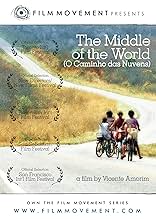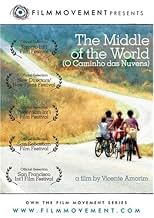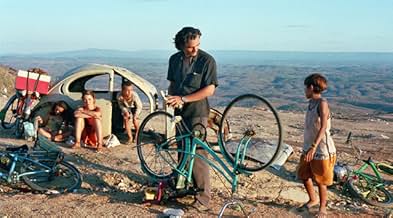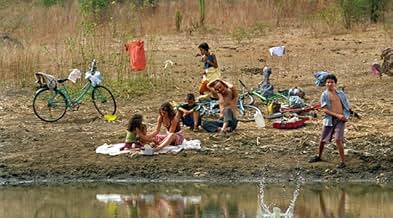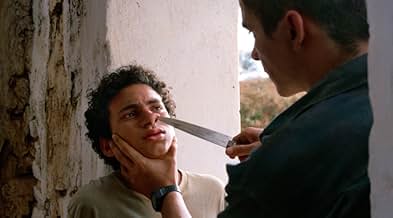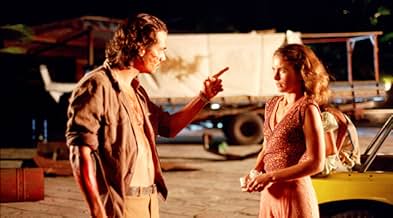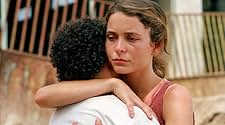IMDb RATING
6.5/10
1.3K
YOUR RATING
A man and his family travel 3200km (1984 miles) by bicycle, from the State of Paraíba to Rio de Janeiro, Brazil, in search of a job.A man and his family travel 3200km (1984 miles) by bicycle, from the State of Paraíba to Rio de Janeiro, Brazil, in search of a job.A man and his family travel 3200km (1984 miles) by bicycle, from the State of Paraíba to Rio de Janeiro, Brazil, in search of a job.
- Awards
- 1 win & 9 nominations total
Manoel Sebastião Alves Filho
- Rodney
- (as Manoel Sebastião)
Felipe Newton Silva Rodrigues
- Clévis
- (as Felipe Newton)
Cícera Cristina Almino de Lima
- Suelena
- (as Cristina de Lima)
Cícero Wesley A. Ferreira
- Cícero
- (as Cicero Wallyson e Ciceero Wesley)
Alexandre Zacchia
- Porfirio
- (as Alexandre Zachia)
- Director
- Writer
- All cast & crew
- Production, box office & more at IMDbPro
Featured reviews
Wonderful movie that shows the lengths many poor people must go through to eke out a living. It shows the strong bond of family, strong bond of husband and wife.
The acting and cinematography was so well, I felt like I was along with them for the ride.
The movie opens up a world many of us never see- the everyday struggle of poverty, especially with family. What would you do to feed your family? I like the way the movie shows the conflict between pride and eating.
I applaud the excellent story telling done by the director, writer, and producer.
The acting and cinematography was so well, I felt like I was along with them for the ride.
The movie opens up a world many of us never see- the everyday struggle of poverty, especially with family. What would you do to feed your family? I like the way the movie shows the conflict between pride and eating.
I applaud the excellent story telling done by the director, writer, and producer.
Part "Road Movie" and part "Coming-of-Age" film, "O Caminho Das Nuvens" is an enjoyable little Brazilian flick that tells us the story of Ramao, his wife Rose, and their 5 children, as they make their way from "The Middle of the World" in Paraíba to Rio de Janeiro, on bikes, in search of work and a place to settle down.
Shot in Neorealist tradition- similar to film's like De Sica's "Bicycle Thief"- we are not shown the beginning of the family's journey, nor it's conclusion...but, rather, are offered a privileged glimpse into a "slice of (this poor family's) life".
The characters are real/regular people, and as such, could represent any one of the countless number of families' that have made similar journeys from rural Brazil to major urban centers like Rio and Sao Paolo, in search of new oppourtunities and a "better life".
From the start, we are privy to the fact that the family has no set destination, little direction, and even less money to survive on. It seems that Ramao has dragged his family on this epic excursion based on a whim, and a slightly psychopathic desire to find a job that pays "1000 reisas a month"- which he feels he will need in order to take care of his large family.
We follow Ramao and his family and observe the trials and tribulations that they must endure during the six month exodus they have embarked on...
To get by the family relies on the generosity of others...begging, panhandling, busking and doing odd jobs that will earn them enough cash to keep food in their bellies. Ramao acts quite callously toward his family, for a man that relies on them for money and survival. These feelings of inadequacy are likely a consequence of his inability to provide for his family.
Tension starts to develop between Ramao, his wife, and their eldest son Antonio, as Ramao repeatedly refuses job oppourtunities that do not meet his moral or monetary expectations. This is exacerbated when he decides to extend their journey, despite pleas from his tired and hungry family.
As Ramao comes to grips with the fact that his dreams and expectations are, in all likelihood, not going to be realized, the film begins to focus on the relationship with his teenage son Antonio.
At the beginning of the film, Ramao treats Antonio like he is an unwanted burden- constantly putting him down- though it seems the family wouldn't be as safe without him. We watch as Antonio becomes more independent; getting his coming-of-age experiences at various stops made by the family along the way. By the second half of the film it becomes clear that, despite their somewhat tenuous relationship, Ramao has been trying to get Antonio ready for life on his own.
As the family nears their next (final?) destination, the film goes out on an emotional note....though we never do find out what fate has in store for them. I guess this is a comment on, "life being about the journey, not the destination".
"The Middle of the World" is a simple, heartwarming film about a family on a journey. The locations and cinematography are beautiful and the acting is pretty good. It's also worth mentioning that the actor playing Ramao (Wagner Moura) looks a helluva lot like Johnny Depp!!! Definitely worth a watch, 6.5 out of 10.
Shot in Neorealist tradition- similar to film's like De Sica's "Bicycle Thief"- we are not shown the beginning of the family's journey, nor it's conclusion...but, rather, are offered a privileged glimpse into a "slice of (this poor family's) life".
The characters are real/regular people, and as such, could represent any one of the countless number of families' that have made similar journeys from rural Brazil to major urban centers like Rio and Sao Paolo, in search of new oppourtunities and a "better life".
From the start, we are privy to the fact that the family has no set destination, little direction, and even less money to survive on. It seems that Ramao has dragged his family on this epic excursion based on a whim, and a slightly psychopathic desire to find a job that pays "1000 reisas a month"- which he feels he will need in order to take care of his large family.
We follow Ramao and his family and observe the trials and tribulations that they must endure during the six month exodus they have embarked on...
To get by the family relies on the generosity of others...begging, panhandling, busking and doing odd jobs that will earn them enough cash to keep food in their bellies. Ramao acts quite callously toward his family, for a man that relies on them for money and survival. These feelings of inadequacy are likely a consequence of his inability to provide for his family.
Tension starts to develop between Ramao, his wife, and their eldest son Antonio, as Ramao repeatedly refuses job oppourtunities that do not meet his moral or monetary expectations. This is exacerbated when he decides to extend their journey, despite pleas from his tired and hungry family.
As Ramao comes to grips with the fact that his dreams and expectations are, in all likelihood, not going to be realized, the film begins to focus on the relationship with his teenage son Antonio.
At the beginning of the film, Ramao treats Antonio like he is an unwanted burden- constantly putting him down- though it seems the family wouldn't be as safe without him. We watch as Antonio becomes more independent; getting his coming-of-age experiences at various stops made by the family along the way. By the second half of the film it becomes clear that, despite their somewhat tenuous relationship, Ramao has been trying to get Antonio ready for life on his own.
As the family nears their next (final?) destination, the film goes out on an emotional note....though we never do find out what fate has in store for them. I guess this is a comment on, "life being about the journey, not the destination".
"The Middle of the World" is a simple, heartwarming film about a family on a journey. The locations and cinematography are beautiful and the acting is pretty good. It's also worth mentioning that the actor playing Ramao (Wagner Moura) looks a helluva lot like Johnny Depp!!! Definitely worth a watch, 6.5 out of 10.
This is the (based on a true) story of a peasant family from northwest Brazil that migrates to Rio. They travel not how people usually do it, but as a family, on bicycles. Five children, mom and Dad, on five bicycles. Six months it takes them, and 3000 kilometers.
It's a wonderful premise for a movie, and I was disposed to like it. I've liked other films about NE Brazil. Vidas Secas by Nelson Pereira dos Santos; Me, You, Them by Andrucha Waddington; Central Station by Walter Salles. I'd like to take another look at the Glauber Rocha films if they ever become available.
But this well intentioned film just didn't make it for me. The actors were too pretty, too handsome, their teeth too perfect and white, their bodies conditioned in a gym, their faces unburnt by a lifetime in the sun. They were too clearly actors in a created scene that was too foreign to them. They just failed to meaningfully embody their characters. It felt like they were following a recipe for acting: recite lines, add so much of this or that emotion, make meaningful glances, and voila, soufflé.
In general, the "acted" scenes filmed in a studio didn't' feel right. They felt more like a mediocre made-for-TV telenovela.
The filmmakers missed the real grit of the sturm und drang of surviving on the road by your wits and your faith. Very few close-ups. The bicycles, for example: we never saw a greasy hand or a wrench or a spoke. The rich texture of the side of the road was strangely missing, such as the people who make huge pots of tripe and rice and beans and sell it to the truck drivers, half the price of restaurant food.
But the gravest mistake was the filmmakers attempt to make the picaresque, true story of a migration/pilgrimage fit into ready-made story lines, including one especially lame subplot about the coming-of-age of the oldest boy, Antonio, his conflict with the father. The eventual resolution of the conflict between father and son was downright bathetic. Saccharin-sweet sentimentality.
The scenes of Brazil were great. The roads, the berm, the sand, the daub and wattle, the life-beside-the-flow of the river/road, the landscape, the cactus, the hot dreamy little towns and villages with their brick streets and bright colors. But still, a little too pretty. I know the scene. I lived in rural northwest Brazil for 4 years and did 80,000 kilometers of traveling in Bahia. I lived in Feira de Santana for a few months, and that city is part of the movie. I love that part of the country and its people. I liked the scenes of Juazeiro.
One scene that totally failed for me was the whole "Panama" episode. It felt like it was written into the script.
The script as a whole was predictable. The attempts at character development seemed to come from the writing. Each time our travelers learn a new lesson, the filmmakers make them stand up and announce it.
The film would have worked better in documentary style, like say Slumdog Millionaire. Imagine if the filmmakers had paused a little more to explore the details of the roadside in northeast Brazil?
It's a wonderful premise for a movie, and I was disposed to like it. I've liked other films about NE Brazil. Vidas Secas by Nelson Pereira dos Santos; Me, You, Them by Andrucha Waddington; Central Station by Walter Salles. I'd like to take another look at the Glauber Rocha films if they ever become available.
But this well intentioned film just didn't make it for me. The actors were too pretty, too handsome, their teeth too perfect and white, their bodies conditioned in a gym, their faces unburnt by a lifetime in the sun. They were too clearly actors in a created scene that was too foreign to them. They just failed to meaningfully embody their characters. It felt like they were following a recipe for acting: recite lines, add so much of this or that emotion, make meaningful glances, and voila, soufflé.
In general, the "acted" scenes filmed in a studio didn't' feel right. They felt more like a mediocre made-for-TV telenovela.
The filmmakers missed the real grit of the sturm und drang of surviving on the road by your wits and your faith. Very few close-ups. The bicycles, for example: we never saw a greasy hand or a wrench or a spoke. The rich texture of the side of the road was strangely missing, such as the people who make huge pots of tripe and rice and beans and sell it to the truck drivers, half the price of restaurant food.
But the gravest mistake was the filmmakers attempt to make the picaresque, true story of a migration/pilgrimage fit into ready-made story lines, including one especially lame subplot about the coming-of-age of the oldest boy, Antonio, his conflict with the father. The eventual resolution of the conflict between father and son was downright bathetic. Saccharin-sweet sentimentality.
The scenes of Brazil were great. The roads, the berm, the sand, the daub and wattle, the life-beside-the-flow of the river/road, the landscape, the cactus, the hot dreamy little towns and villages with their brick streets and bright colors. But still, a little too pretty. I know the scene. I lived in rural northwest Brazil for 4 years and did 80,000 kilometers of traveling in Bahia. I lived in Feira de Santana for a few months, and that city is part of the movie. I love that part of the country and its people. I liked the scenes of Juazeiro.
One scene that totally failed for me was the whole "Panama" episode. It felt like it was written into the script.
The script as a whole was predictable. The attempts at character development seemed to come from the writing. Each time our travelers learn a new lesson, the filmmakers make them stand up and announce it.
The film would have worked better in documentary style, like say Slumdog Millionaire. Imagine if the filmmakers had paused a little more to explore the details of the roadside in northeast Brazil?
10annepg
Rarely does one have the opportunity to see such a unique, honest and beautiful movie, specially when it comes to dealing with such difficult issues such as poverty, a family's struggle to stick together and overcome all sorts of misadventures. This is a beautifully shot road movie on bicycles - based on a true story - that can be compared to The Bicycle Theif, and another Brazilian master piece by Nelson Pereira dos Santos: Vidas Secas (Barren Lives, is the English title) (based on a novel). Everyone should get to see this movie.
May be the summary say it all but the movie it's so great that I'm gonna give interested people more info about it. Is the first time in the latinamerican movie history when a director make a movie about being poor is not a terrible drama, it's just life, nothing more and nothing less. You can watch how is it the Latin American way to live the poverty: It's a daily drama that everybody lives each day of their life and that make's life less dramatic. In the movie you can found a typical family and the play of each character are the same in every place in the world without differences of social class. In the film you can make a road-trip from the north to the south of Brazil but without the typical beach and sun scenery. No, here it is another part of Brazil, that part where the real people live and tourism don't show. Incredible characters and fantastic places.
Did you know
- TriviaCarol Castro's debut.
- ConnectionsReferenced in A Dona da História (2004)
Details
- Release date
- Country of origin
- Official site
- Languages
- Also known as
- The Path of the Clouds
- Filming locations
- Production companies
- See more company credits at IMDbPro
Box office
- Gross worldwide
- $13,278
- Runtime
- 1h 25m(85 min)
- Color
- Sound mix
- Aspect ratio
- 1.66 : 1
Contribute to this page
Suggest an edit or add missing content


